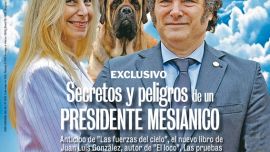President Mauricio Macri has flown to Colombia to attend in the swearing-in ceremony of the country's new president, Iván Duque, in Bogotá.
The Argentine head of state left on a private flight this morning bound for the CATAM military airport in the Colombian capital, arriving just after noon.
Macri will meet with Duque privately during his time in Colombia and is also expected to spend time with the US Ambassador to the United Nations, Nikki Haley, who is representing US President Donald Trump at the ceremony. He was due to lunch at the Marriot Hotel with Chilean President Sebastián Piñera.
At 5pm (Argentine time), he will head to the Plaza de Bolivar, next to the Colombian Congress, to witness outgoing president Juan Manuel Santos handover the presidency to Duque, who may work to undo the deal his predecessor reached with leftist FARC (Revolutionary Armed Forces of Colombia) guerrillas to end a half-century of conflict.
Several other regional leaders will attend today's ceremony, including Mexico's Enrique Peña Nieto and Ecuador's Lenín Moreno.
Challenges ahead
Colombia's new president, who is just 42 years old, will have his work cut out for him as he takes office, amid heightened tensions with neighbouring Venezuela and the lingering difficulties of peace-building with the nation's rebel groups.
The former lawyer and senator also must face an ongoing battle against drug-traffickers, a shocking spate of murders of rights activists and a promise to implement agrarian reform.
Duque's success will depend in large part on his connection to popular former president Álvaro Uribe (2002-2010), who handpicked the political novice to help the right – which opposed the deal with the FARC to regain power.
"His mentor's situation and relations with Venezuela are the keys" to Duque's presidency, said political scientist Diana Avellaneda from the Pontifical Xavierian University.
Tense ties with Caracas
Relations with Caracas took a dive at the weekend when Venezuela President Nicolás Maduro claimed to have been the victim of an "assassination" attempt – and put the blame on Santos, "ultra right-wing" domestic opponents and the US. Bogotá called the accusation "absurd."
Duque looks set to stand up to Colombia's neighbour to the east, demanding "free elections" following a May poll that saw Maduro re-elected, which was boycotted by Venezuela's opposition. The neighbours share a 2,200-kilometre (1,400-mile) long border that is hard to police.
Bogota has accused Caracas of harboring Marxist rebels, while hundreds of thousands of Venezuelans have crossed the border to escape food and medicine shortages, failing public services and hyperinflation in their homeland.
If Duque "starts answering everything Maduro says... he will add fuel to the propaganda and political fire to keep ratcheting up the tension," said international relations expert Jairo Velásquez. The analyst added that the new Colombian leader could become Venezuela's "enemy, real or imagined."
Peace with rebels?
At home, Duque's firebrand rhetoric has increased tension and rocked already fragile relations with rebels, both former and current. Upon his election in June, he vowed to make "corrections" to the peace deal with the FARC, which he criticised for being too lenient in allowing former rebels accused of atrocities to serve as lawmakers.
Ending 50 years of conflict that has cost the lives of 260,000 people and left more than seven million displaced is no easy undertaking. But Duque – with Uribe's backing – has made it clear he thinks the deal is deeply flawed.
Meanwhile, Santos admitted defeat in his bid to negotiate a ceasefire with the Marxist ELN rebel group and its 1,500 armed members despite making "significant progress." Under Duque, who certainly has a tougher approach to the ELN, those talks will likely stall.
Political wrangling at home
While his tough stance on peace may give Duque headaches upon taking office, he could also suffer from the rug supporting his political ambitions being wrenched out from under him.
As the hand-picked choice of Uribe, president from 2002-2010, he enjoys considerable support from the powerful Democratic Center party his mentor launched. But the 66-year-old Uribe, now a senator, is accused of witness interference and faces a Supreme Court investigation, and an uncertain political future.
At least Duque can call on strong regional ties amidst a recent upsurge in the fortunes of the political right on the continent, notably Argentina, Chile and Peru. Brazil may follow suit in October.
But in addition to woes with Venezuela to the east, all is not serene on Colombia's southern border, where Ecuador has been angered over the drug-trafficking violence spilling across its frontier.
In Colombia, some 209,000 hectares (516,500 acres) of land are used to grow coca, the principal ingredient used to manufacture cocaine. Colombia is the largest cocaine producer in the world.
Ecuador had agreed to host peace talks with the ELN but rescinded that offer back in May in protest at border violence.
- TIMES/NA/AFP

























Comments